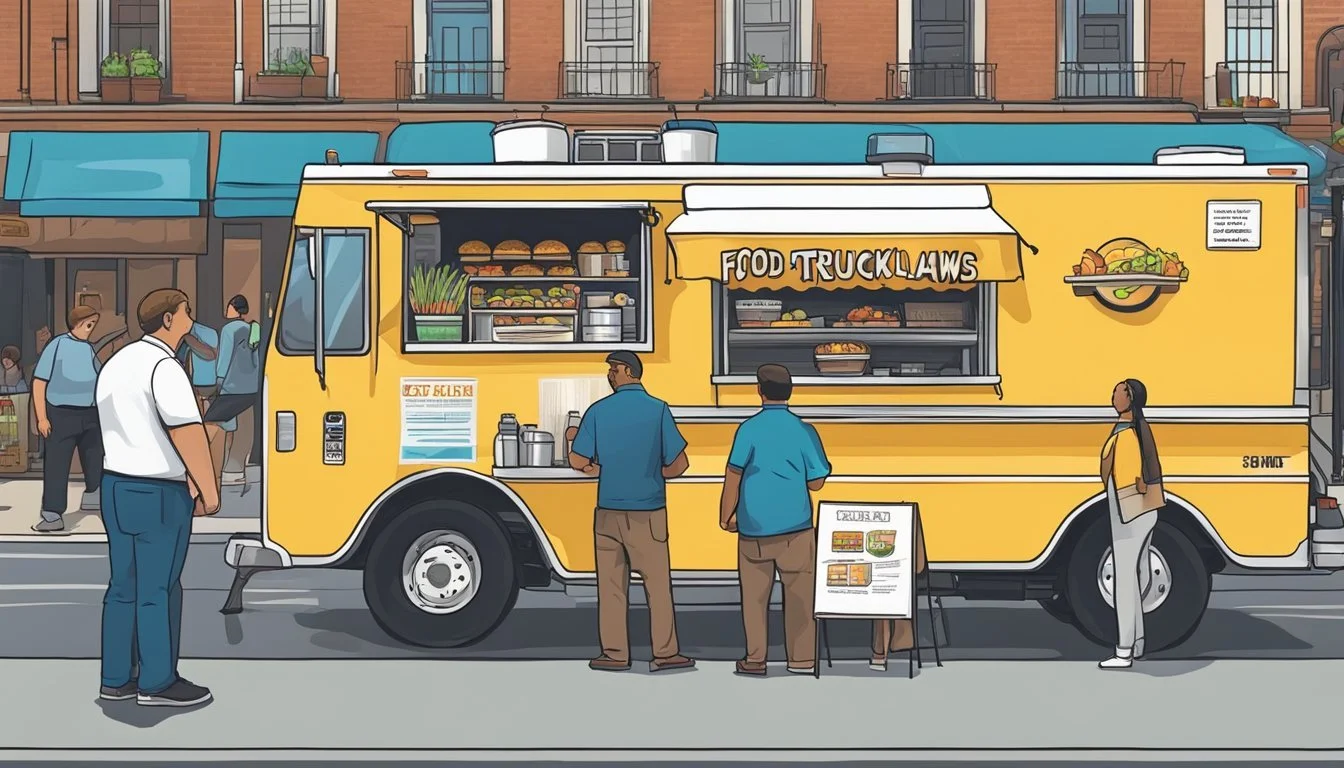Food Truck Laws in New Jersey
A Comprehensive Guide
Navigating the legal intricacies of the food truck industry requires a thorough understanding of the laws and regulations specific to each state. In New Jersey, the bustling food truck scene is governed by a set of rules that are enforced to ensure public safety, fair commerce, and the well-being of the community. These regulations are intended to standardize operations across the multitude of towns and counties within the state, addressing everything from food safety to local zoning laws.
The regulations in this state dictate that food trucks must obtain various licenses and permits before hitting the streets. This includes, but is not limited to, a business license, mobile food facility permit, and a health department certificate. Complying with food truck laws and regulations in New Jersey is not just about legality; it is essential for the smooth operation of a food truck in a highly competitive market. These prerequisites vary by locality, meaning that food truck operators must stay well-informed of the continually evolving statutes within their designated operation areas.
An indispensable part of starting a food truck in New Jersey is achieving food safety certification. Knowledge of proper food handling and preparation is critical to prevent foodborne illnesses and ensure customer safety. The state's Department of Health extends its oversight through regulations for retail food establishments, which includes food trucks. These guidelines ensure that all mobile food vendors adhere to the high standards set for food safety and sanitation, echoing federal food safety practices.
Starting a Food Truck Business in New Jersey
In New Jersey, launching a food truck business involves careful planning, securing appropriate documentation, and meticulous outfitting of your mobile eatery. Each step is crucial in cultivating a successful food service venture on wheels.
Creating Your Business Plan
A comprehensive business plan is the cornerstone of any successful food truck venture in New Jersey. It should articulate clear objectives for your food truck, including detailed marketing strategies and realistic revenue projections. Your food truck business plan must address the unique challenges of mobile food service, from menu creation to location scouting.
Registering Your Business
To legally operate in New Jersey, you must register your business with the New Jersey Division of Revenue and Enterprise Services. This may include filing a DBA (Doing Business As) if operating under a trade name and obtaining an Employer Identification Number (EIN) for tax purposes. Registration may also involve local county clerk offices, depending on your business structure and location.
Securing Essential Licenses and Permits
Running a food truck requires multiple licenses and permits. You will need a business license, a food service license, and recognition as a mobile retail food establishment. New Jersey law stipulates that these credentials should be obtained before commencing operation, ensuring your food truck meets all health and safety regulations.
Designing Your Menu
The menu is a defining aspect of your food truck, offering a selection of menu options that should align with your brand and customer expectations. When designing your menu, consider the availability of ingredients, preparation time, and how well the item will fare in a mobile setting. Keep the menu focused and manageable to maintain consistent quality and speed of service.
Selecting and Equipping Your Food Truck
Choosing the right food truck requires balancing budget with needed space for cooking appliances, ovens, storage, and inventory. Ensure your vehicle includes a fire suppression system for safety. Equip your truck with high-quality appliances that meet your culinary needs and are durable enough for the rigors of daily operation on the streets of New Jersey.
Legal and Regulatory Compliance
Operating a food truck in New Jersey requires meticulous adherence to various state and local laws. Food truck owners must navigate through a complex maze of rules and regulations to ensure full compliance. This includes obtaining the necessary licenses, meeting health and safety standards, respecting zoning laws, and securing appropriate insurance coverage along with workers’ compensation.
Understanding State and Local Laws
Food truck operators in New Jersey are subject to state-mandated regulations as well as city ordinances. They must secure a business license and comply with the New Jersey Department of Labor's Wage and Hour Compliance for fair employment practices. Additionally, it is crucial to be familiar with any city-specific laws which can impact day-to-day operations.
Health and Safety Regulations
The New Jersey Department of Health mandates that all food trucks have a Mobile Food Facility Permit and pass a health inspection. Food operators are required to obtain a food safety certification, and a Food Protection Manager Certification is often necessary. These certifications ensure that food truck staff is trained in food safety protocols essential for public health.
Zoning and Parking Requirements
Compliance with zoning requirements is crucial for food truck operations. Food truck owners must research and obtain the appropriate zoning permits to avoid prohibited areas. Secure parking permits can dictate where a food truck may operate within a city, having a significant impact on the business.
Insurance and Workers’ Compensation
Carrying the right insurance is essential not only as a legal requirement but also for financial protection. Food truck owners in New Jersey must ensure their business is insured against accidents, property damages, and liability claims. Moreover, they are responsible for providing workers’ compensation insurance, covering employees in case of work-related injuries.
Operational Fundamentals
Ensuring the success of a food truck in New Jersey involves a meticulous approach to building a solid operational foundation. Food truck operators must manage a variety of essential components from assembling a dependable team to effective financial oversight.
Building Your Team
The personnel behind a food truck are pivotal to its operation. Each team member, ideally holding a food handlers license, should be selected for their reliability and ability to provide consistent service. Collaborating with a commissary kitchen can also provide a home base for preparation and supply storage.
Sourcing Food Supplies
A food truck's reputation hinges on the quality of its supplies. Operators must secure reputable suppliers that provide fresh ingredients. Strong relationships with these suppliers are essential, as is the strategic use of a commissary kitchen for food storage and prep to comply with the local health department standards.
Financial Management
Effective financial management is crucial in monitoring the health of a food truck business. Operators should keep meticulous records of all sales tax collected and remit it properly. Regularly reviewing revenue and taxes helps to maximize profits and avoid fines associated with non-compliance.
Navigating Inspections and Avoiding Fines
Inspections by the local health department are a routine part of food truck operation, ensuring that public health is not compromised. Food truck operators can avoid costly fines by keeping their mobile establishment in adherence to all applicable regulations, including cleanliness, food safety, and proper food handling practices.
Promotion and Branding
Promotion and branding are crucial for food truck owners in standing out in a bustling market. A robust strategy encompasses digital marketing, eye-catching signage, and community engagement to draw in customers.
Effective Marketing Strategies
Food truck owners can leverage the power of social media platforms like Facebook, Instagram, and Twitter to connect with potential customers. Daily posts featuring mouth-watering photos, menu updates, and special promotions can entice a following and generate buzz. Employing a consistent hashtag that aligns with the brand can also aid in tracking the reach and engagement of social media efforts.
Physical Advertising and Signage
Signage plays a pivotal role in the mobile food market, acting as both an identifier and an enticement for hungry patrons. Bold and clear signage that reflects the food truck's branding ensures visibility at events and street corners. Compliance with local New Jersey regulations regarding the size and placement of signs is essential to avoid code violations.
Signage Best Practices:
Use vibrant colors and legible fonts.
Display menu items and prices clearly.
Ensure signs adhere to local guidelines.
Networking with the Food Truck Community
Joining the New Jersey Food Truck Association can provide invaluable opportunities for networking. Relationship building within the community opens doors to collaborative events and shared resources. Networking can lead to partnerships that may result in collective marketing campaigns, expanding reach beyond individual capabilities.
Networking Goals:
Build relationships with fellow food truck owners.
Collaborate on joint events or promotions.
Share best practices and insight on effective branding.
Expanding Your Business
When taking steps to expand a food truck business in New Jersey, owners should strategically explore new locations, catering opportunities, partnerships, and ways to enhance the customer experience. These efforts can significantly contribute to the growth of the enterprise.
Finding Prime Locations
Food truck operators should diligently research to secure prime locations that attract high foot traffic. Common hotspots include food festivals, farmers’ markets, and fairs. To operate in these lucrative spots, obtaining the necessary parking permit is essential to comply with local regulations.
Exploring Catering and Special Events
Incorporating catering services and appearing at special events can diversify a food truck's revenue streams. Food truck owners need to acquire a special event permit and foster relationships with event organizers to tap into corporate functions, weddings, and community gatherings.
Partnering with Local Businesses
Partnerships with local businesses, notably brick-and-mortar restaurants, can create symbiotic relationships beneficial for growth. These collaborations may involve cross-promotion or setting up at the business locations during special promotions or events.
Adding Outdoor Seating and Service
Enhancing customer service with the addition of outdoor seating can transform the food truck experience. This move can make the food truck akin to traditional restaurants, offering comfort while patrons enjoy their meals and potentially attracting a different customer base.
Additional Considerations
When operating a food truck in New Jersey, entrepreneurs must be mindful of specific regulations and strategies that can impact their business. This includes understanding the guidelines for alcohol sales, the benefits of joining industry associations, and the importance of maintaining an active online presence.
Alcohol Sales and Licensing
Selling alcohol can significantly increase a food truck's revenue, but it comes with stringent regulatory requirements. In New Jersey, obtaining a liquor license is a prerequisite for any food truck considering alcohol sales. This process often involves navigating local ordinances, which can vary greatly from one municipality to another.
Becoming a Member of Industry Associations
Membership in industry-specific associations, such as the New Jersey Food Truck Association, provides numerous benefits. These organizations advocate for the interests of food truck owners, offer resources and networking opportunities, and keep members informed about changes in legislation and business opportunities.
Regular Updating of Website and Social Channels
An updated website and active social media channels are essential for the success of a food truck. They ensure that customers can find current information about location, menu items, and hours of operation. This constant communication also builds a loyal following and can increase customer engagement for the New Jersey food truck business.




